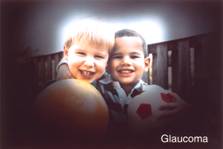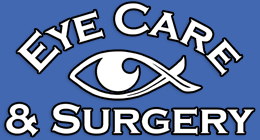Glaucoma is an eye disease that slowly and painlessly steals away your sight. It does not make your eyes red or cause pain, but it is the second leading cause of blindness in the United States. Over half of the people who have glaucoma don’t know they have the disease and are not aware they are going blind.
Risk Factors:
The cause of glaucoma is unknown, but there are several risk factors that increase your risk of developing glaucoma. These include:
• High Eye Pressure (called intraocular pressure, or IOP)
• Older Age
• African or Hispanic Ancestry
• Family History
Anyone with any of these risk factors should get regular eye examinations to look for glaucoma.
Glaucoma Damage:

Glaucoma damages vision by destroying the optic nerve, which connects your eye to your brain. The optic nerve carries visual information to your brain for processing. When damage to the optic nerve occurs from glaucoma, you lose your vision. Your peripheral vision (or side vision) is lost first. If glaucoma remains untreated, the vision loss creeps in toward the center, first causing tunnel vision, and eventually blindness.
Glaucoma Examination:
A thorough examination for glaucoma should include the measurement of IOP. Since some eyes can have glaucoma without high IOP, a careful examination of the optic nerve is very important. If the IOP is high or the optic nerve looks damaged, a visual field test should be performed. A visual field test shows whether any peripheral vision lost has occurred.
Treatment:
If you are diagnosed with glaucoma, treatment is available to save your vision. The goal of glaucoma treatment is to lower IOP and stop damage to the optic nerve. Several kinds of treatment are available to lower IOP. These include eye drops, laser therapy, and surgery.
Eye drop medications lower IOP by either reducing the amount of fluid entering the eye or increasing the amount of fluid exiting the eye. There are several different kinds of glaucoma medications, and each differs in terms of both their ability to lower IOP and potential side effects. Laser therapy is often used in cases where medications fail to successfully lower IOP, or when patients cannot tolerate medications due to side effects. Recent advances have produced lasers so safe and effective that for some patients, laser therapy is used instead of medications. If medications and/or laser therapy fail to bring the IOP down to a safe range, surgery is available to lower IOP.
At Eye Care & Surgery our eye doctors will work with you to develop a treatment plan that will safely lower your IOP.
For more information or to schedule an appointment please contact us.

